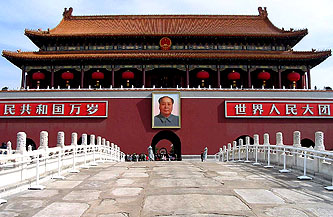 The New York Times writes about Barack Obama’s visit to China:
The New York Times writes about Barack Obama’s visit to China:
What emerged after six hours of meetings, two dinners, and a stilted 30-minute presentation to the press in which Chinese President Hu Jintao would not allow questions, was a picture of a China more willing to say no to the United States.
….On everything from Iran, where Mr. Hu did not publicly discuss the possibility of sanctions, to currency, where he made no nod toward changing the value of the renminbi, to human rights, where a joint statement bluntly acknowledged that the two countries “have differences,” China held firm against most American demands.
Am I missing something here? China has always stage-managed American visits, it’s never supported sanctions against Iran, it’s consistently declined to change the renminbi peg to the dollar, and it’s never made any substantive concessions on human rights. So in what way was China “more willing” to say no than before?
The current popular narrative about China is all about how they’re growing up, getting richer, and exercising increased leverage over the U.S. because of their huge dollar holdings. And obviously there’s some truth to all that. Still, in this case it seems as if reporters are letting their internal narratives drive their reporting, rather than the other way around. China’s been saying no the United States for a long time.
UPDATE: The Washington Post gets into the act too:
If there was any significant change during this trip, in fact, it was in the United States’ newly conciliatory and sometimes laudatory tone. In a joint appearance with President Hu Jintao on Tuesday, Obama hailed China as an economic partner that has “proved critical in our effort to pull ourselves out of the worst recession in generations.” The day before, speaking to students in Shanghai, he described China’s rising prosperity as “an accomplishment unparalleled in human history.”
Obama’s trip stood in stark contrast to visits by his predecessors. But this reflected not so much a policy shift by a new administration in Washington as a dramatic and much bigger change in the power dynamic, particularly in economics, over the past decade — a change that has been the central undercurrent of Obama’s swing through China this week.
Maybe so. But Obama has taken a “conciliatory and sometimes laudatory tone” with everyone. He’s famous for it. Conservatives complain about it endlessly. There’s really no reason to think this is due to China’s increased economic influence unless that’s the narrative you were determined to start with in the first place.

















